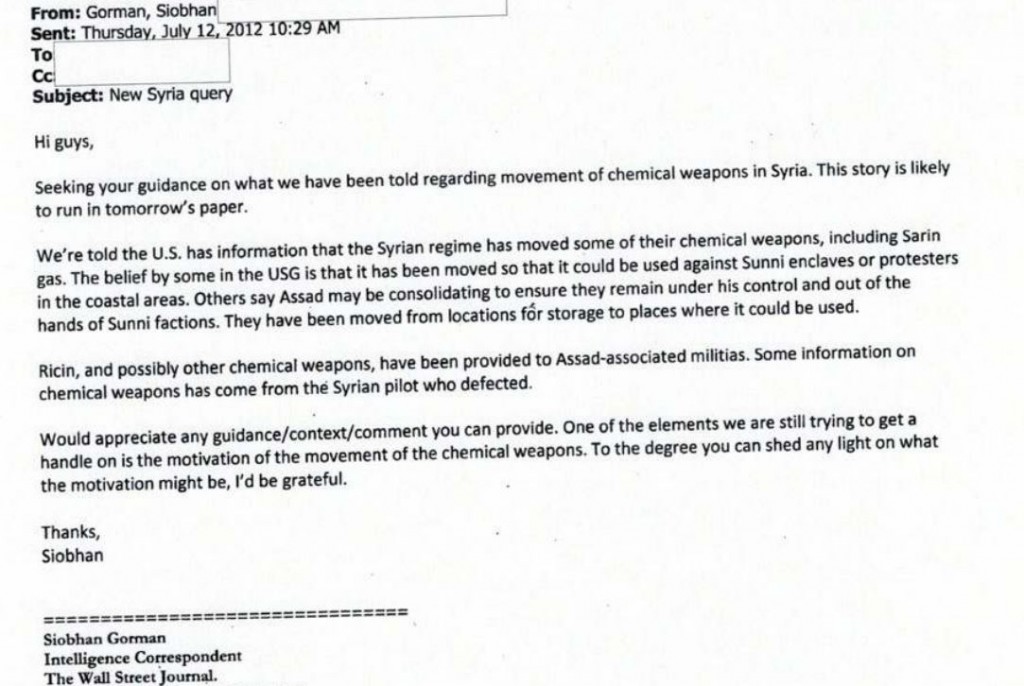What Drove Timing of NYTimes Publishing Risen-Apuzzo Disclosure of McHale Jundallah Contacts?
Saturday night, the New York Times published a blockbuster article by James Risen and Matt Apuzzo that was then carried on the front page of Sunday’s print edition. The article described the jaw-dropping revelation that somehow, a lowly Port Authority detective wound up as the primary contact for Jundallah, a Sunni extremist group on the Iran-Pakistan border that attacks Iran (and sometimes Pakistan) with an aim to unify the region that is home to the Baloch people. Further, it appears that through Thomas McHale’s contacts (and McHale’s membership in a Joint Terrorism Task Force), information on Jundallah attacks filtered into the CIA and FBI prior to their being carried out in Iran.
Iran has long accused the US and Israel of having associations with Jundallah, even going so far as to state that the CIA and/or Mossad equip them and help them to plan their attacks. With negotiations between the P5+1 group of countries and Iran now in the home stretch toward a November 24 deadline, Saturday’s disclosure could hardly have come at a worse time. In fact, John Kerry was in Oman, meeting with Iranian Foreign Minister Mohammad Zarif and Catherine Ashton from the EU over the weekend. Despite this disclosure coming out, Sunday’s negotiating session turned into two sessions and a further session was even added on Monday. Upbeat news is still flowing from that meeting, so on first blush the disclosure Saturday didn’t completely disrupt the talks.
My first thought on seeing the article was that it fit perfectly with the previous front page effort by the Times at disrupting the talks. David Sanger “mistakenly” claimed that a new wrinkle in the negotiations would allow Russia to take over enrichment for Iran. This would almost certainly give hardliners the room they need to kill the deal, since maintaining enrichment capacity is a redline issue for Iran.
The reality is that what is under discussion is that Iran would continue its enrichment activities, but ship low enriched uranium to Russia where it would be converted into fuel rods. Evidence that this pathway is making progress can be seen in this morning’s announcement that Iran and Russia have signed an agreement for Russia to build two more nuclear power plants in Iran. It seems that a new wrinkle on the arrangement might allow Russia to prepare the fuel rods inside Iran:
Russia, which is involved in those talks, will also cooperate with Teheran on developing more nuclear power units in Iran, and consider producing nuclear fuel components there, according to a memorandum signed by the heads of the state atomic bodies, Sergey Kirienko of Russia’s Rosatom and Ali Akbar Salehi of Iran’s Atomic Energy Organization (AEOI).
Just as hinting falsely that Iran was negotiating away its enrichment technology was a move by the Times that could have disastrous effects on the ongoing negotiations, I felt that providing this strange story on McHale would give ammunition to those in Iran who see the CIA behind Jundallah. However,there is another possibility. In a Twitter discussion with Arif Rafiq on the disclosure, Rafiq suggested that “the US is coming clean about something that has concerned Iranians for years. Could be a plus”. He later allowed that hardliners could see it as a smoking gun. A further interesting speculation from Laura Rozen on Twitter suggested that perhaps the US played both sides of Jundallah:
@barbaraslavin1 @mattapuzzo @mlcalderone @JamesRisen so did the US give Rigi up to the Iranians?
— Laura Rozen (@lrozen) November 9, 2014
So let’s consider these nicer possibilities for a moment. Maybe we did give Rigi to the Iranians. Maybe we are admitting Jundallah contacts now as a way of making sure it ends. But if that is the case, Risen and Apuzzo are a very strange source for how this news came out. An admission of this sort is what I would expect to be routed through David Ignatius, Eli Lake or Josh Rogin. Risen would be especially difficult to see as cooperating with specific timing on a disclosure. Recall that the Times spiked his disclosure of Bush’s illegal wiretaps until after the 2004 elections and then only published when the book was about to drop. To believe that Risen is now somehow cooperating with the government is a huge stretch, but he does still appear to be at risk of being subpoenaed in the ongoing DOJ actions in response to the wiretapping disclosure.
Many issues surrounding US support for Jundallah (and MEK) are still quite unresolved in my view. Recall that we had the whole “false flag” controversy back in January of 2012, where it was “disclosed” that Mossad ran Jundallah while posing as CIA. Not too long after that, Sy Hersh disclosed that the US has trained operatives for the MEK (no mention of Jundallah at all in the article) for covert actions against Iran. What particularly raised my hackles in that report was that the training was held at the same site in Nevada where I suspect that the materials used in the 2001 anthrax attacks was produced.
Over at Moon of Alabama, b seems to feel that the US was indeed behind the running of Jundallah. For that to be the case, we are pretty much forced to believe that Risen and Apuzzo have been either duped or coerced. I find so much of what has come out to be conflicting that I doubt we’ll ever completely sort this out. I have no doubts that JSOC and CIA stand ready to see Iran’s enemies prosper, especially as we saw in the MEK training in Nevada. When it comes to involvement in actual operations, I just don’t know. But the possibility that we helped at some times and then handed over Rigi possibly to make up for it sounds so like what our rudderless intelligence services would do that I’m leaning that direction.



